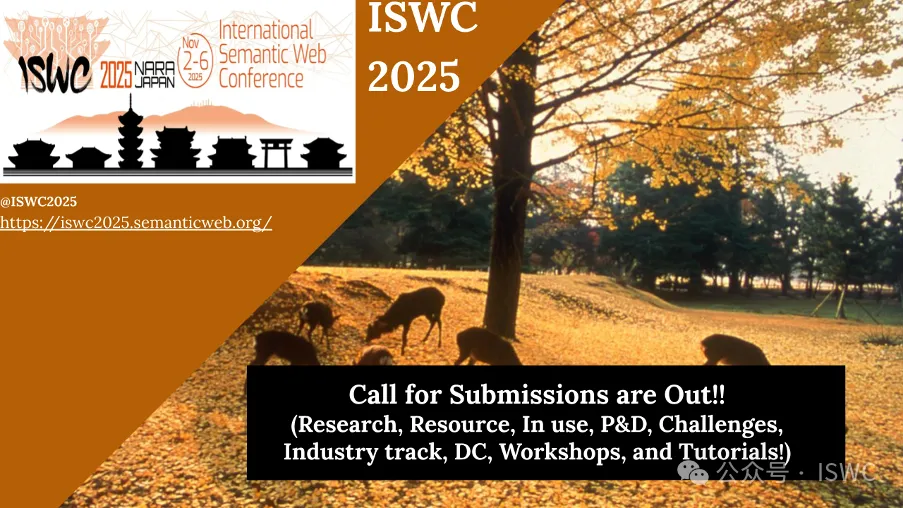International Semantic Web Conference(ISWC)是知识图谱(语义网)领域的重要国际会议(CCF-B类),今年将在日本奈良召开第24届会议,投稿截止5月13日(AoE),欢迎大家投稿和参会!

https://iswc2025.semanticweb.org/
本届会议包含Research、Resource、In-Use、Industry、P&D、DC等Track,还有Workshop、Tutorial、Semantic Web Challenges等活动。下面简单介绍Research Track和Resource Track的主要征稿内容,请访问会议网站获取具体投稿说明和会议其它信息!
1. Call for Research Track Papers
The research track of ISWC 2025 solicits novel and significant research contributions addressing theoretical, analytical, and empirical aspects of the Semantic Web. We welcome work describing original and replicable research showing evidence of significant contribution to the Semantic Web.
Important Dates
Abstract submission due: May 6th, 2025
Full paper submission due: May 13th, 2025
Rebuttal: June 17th - 20th, 2025
Notifications: July 17th, 2025
Camera ready papers due: July 31st, 2025
All deadlines are 23:59 AoE (anywhere on Earth)
Topics of Interest
We encourage papers that directly contribute to the advancement of the Semantic Web area. The relationship to the core area of the conference needs to be clearly described in the submitted work. Submissions beyond the scope will be desk-rejected. Topics in the Semantic Web area include, but are not limited to:
Ontologies and capturing knowledge including:
Ontology Engineering and ontology patterns
Ontology modularity, mapping, merging, and alignment
Information extraction, knowledge graph construction
Representation, management, and applications of Knowledge Graphs (including RDF and property graphs):
Knowledge Representation and Reasoning
Search, query, integration, and analysis
Robust and scalable management
Information visualization and exploratory analysis
Databases and ontology-based data access, integration and exchange on the Web
Knowledge graph centered Natural Language Processing, information retrieval, semantic analysis, and Large Language Models
Integration of the Semantic Web with:
Machine learning, data mining, and neural symbolic reasoning
Generative AI (Large Language Models)
User interfaces, usability, and accessibility
Data integration, quality assurance, and data provenance
Social issues including trust, bias, fairness, privacy, security, and policy
Web services, process management, social Web, and Internet of Things
Dynamic and streaming data, including complex event processing and stream reasoning
Software engineering, algorithms, and decentralized architectures
Specialized domains (geographical, biomedical, e-Science, multimedia, performing arts, public administration, cultural heritage, law, etc.)
Artificial Intelligence and hybrid approaches (including human-machine intelligence)
Semantic Web Agents including:
Autonomous systems, including multi-agent systems and robotics
Architecture characteristics for autonomy exploiting KGs
Incomplete or conflicting knowledge, beliefs, and assumptions and KGs
Human-machine social interactions and KGs
Architecture characteristics for exploiting KGs autonomously
Development platforms and frameworks for exploiting KGs in an autonomous manner
Governance of autonomous agents on the Web
2. Call for Resource Track Papers
The ISWC 2025 Resources Track aims to promote the sharing of resources that support, enable, or utilize semantic web research. We welcome descriptions of resources that leverage knowledge representation based on Semantic Web standards or other graph data models to improve the acquisition, processing, and sharing of data on the web.
Resources include, but are not restricted to: datasets, knowledge graphs, ontologies/vocabularies, ontology design patterns, evaluation benchmarks or methods, software tools/services, APIs and software frameworks, workflows, crowdsourcing task designs, protocols, methodologies, and metrics, that have contributed or may contribute to the generation of novel scientific work and applications in the semantic web. In particular, we encourage the sharing of such resources following the best and well-established practices within the semantic web community. As such, this track calls for contributions that provide a concise and clear description of a resource and its usage.
Important Dates
Abstract submission due: May 6th, 2025
Full paper submission due: May 13th, 2025
Rebuttal: June 17th - 20th, 2025
Notifications: July 17th, 2025
Camera ready papers due: July 31st, 2025
All deadlines are 23:59 AoE (anywhere on Earth)
Resources of Interest
A typical Resource Track paper has its focus set on reporting on resources that fall into one of the following categories:
Datasets produced:
to support specific evaluation tasks (for instance, labeled ground truth data);
to support novel research methods;
by novel algorithms.
Knowledge graphs, represented using semantic web technologies or other graph models for web data, which can be reused in research or industry.
Ontologies, vocabularies, and ontology design patterns, with a focus on describing the modelling process underlying their creation.
Reusable software and services, e.g., prototypes/services supporting a given research hypothesis and enabling specific data processing and engineering tasks.
Community-shared software frameworks that can be extended or adapted to support scientific study and experimentation.
Crowdsourcing task designs that have been used and can be (re)used for building resources such as gold standards and the like.
Benchmarking activities focusing on datasets and algorithms for comprehensible and systematic evaluation of existing and future systems.
Novel evaluation methodologies and metrics, and their demonstration in an experimental study.
Protocols for conducting experiments and studies.
Educational Material for and about semantic technologies and techniques, including curriculum pertaining to education about knowledge graphs, ontologies, or other semantic technologies (e.g., well-described tutorials), and semantic artifacts (e.g., knowledge graphs or ontologies) that can be used to enhance education.
Differentiation from the Other Tracks
We strongly recommend that prospective authors carefully check the calls of the other main tracks of the conference in order to identify the optimal track for their submission. Papers that propose new algorithms and architectures should be submitted to the regular Research track, whilst papers that describe the use of semantic web technologies in practical settings should be submitted to the In-Use track.
When new reusable resources are produced during the process undertaken for achieving these results, such as datasets, ontologies, workflows, etc., and they can be reused on a wider range of use cases, they are suitable subjects for submission to the Resources Track. As examples of resources that fit the Resource Track, consider tools immediately available for reuse, or benchmarks where baseline algorithms are only used to prove their relevance.
Don’t miss this opportunity! We would like to see you in Japan!